July 9, 2007
We took Sunday off and shot this video:
It was good to be back in Paris, and it was good to have gotten a day of rest. It was good to have clean laundry and we even got ourselves a good night's sleep. But we did not come to Paris for a vacation where we sit around the house and watch television. There was a whole city out there waiting to be seen, and all we'd seen was the Left Bank and the Latin Quarter.
This was also the first day our Museum Pass went into effect, which gave us free entry into sixty museums in and around Paris. Some of them were essential, like the Louvre and the Pompidou Center. Some of them were stupid, like the Musee de l'Assistance Publique (which I'm literally translating as the Museum of Public Assistance) and which I kept imagining as, "Monsieur, le fromage de gouvernement." So we had to get a move-on, but we still gave ourselves a little bit later start.
This morning was starting out with the Champs Elysees, the large parade-suitable road that radiates out from the Arc de Triomphe and comprises a major shopping and tourism area, similar to Michigan Avenue in Chicago or the Las Vegas Strip. We would be climbing to the top of the Arc to start our morning. Here's the view coming up the escalator:
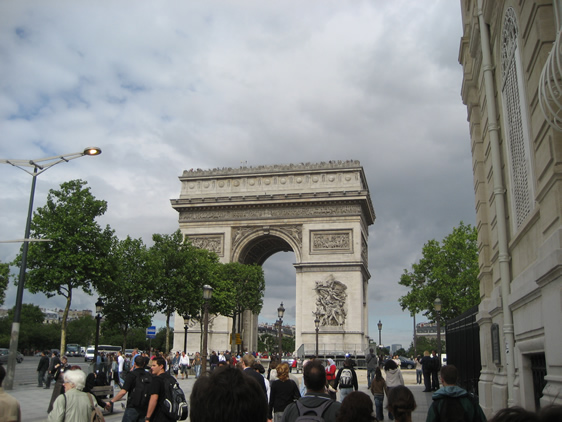
The place was crowded with gypsy types asking, "Speak English? Speak English? I spoke just as much English to them as I do to strangers asking me for things anywhere.
The Champs Elysees roundabout surrounding the Arc is one of Europe's Big Traffic Adventures. Once you get onto the cobblestones, they don't even bother with the lane lines anymore-it's every homme for himself. I filmed thirty seconds in which nobody got hit, but I think that was just a lucky few moments..
The Arc du Triomphe makes note of France's military victories, particularly when Napoleon dusted most of the continent, as well as memorials to France's war dead in both world wars, Korea and Vietnam, and some other locations. There is a large bronze plaque commemorating one of Charles de Gaulle's radio speech from London, telling the French that their government sold them out, and imploring them not to give up, it wasn't over, because other nations would help them.
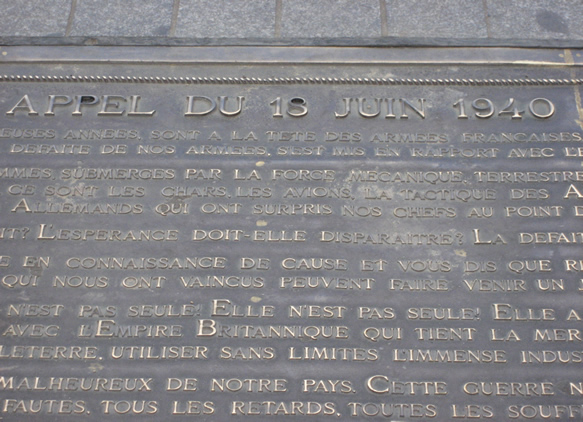
We went up to the top and looked out. I took, by my rough estimation, about 427 pictures in each direction, but I'll give my my patented Tall Places Approach:
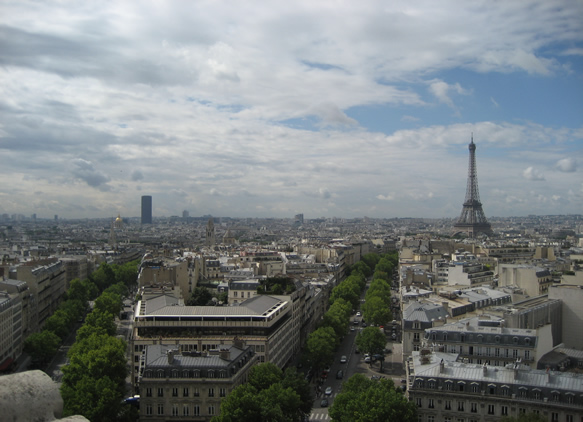
Hey kids, look! It's the Eiffel Tower! (And I'll even cheat a little bit and say, ..."and Tour Montparnasse on the left!")
We made our way back down and crossed through the underground tunnel again. We walked down the Champs Elysees and stopped in a couple stores, one of them being the Virgin Megastore. Ken was like a shark let loose in a salmon farm, Julie was looking for some very specific things, and I just sort of took it all in. It disgusted me that there was a better collection of blues CDs here than I had been able to find at most places in Chicago. I scanned the racks for the Pogues and Rolling Stones imports out of habit, then backed off when I saw the imports were from Los Angeles. I figured with the currency difference I would be better off buying from Amazon.
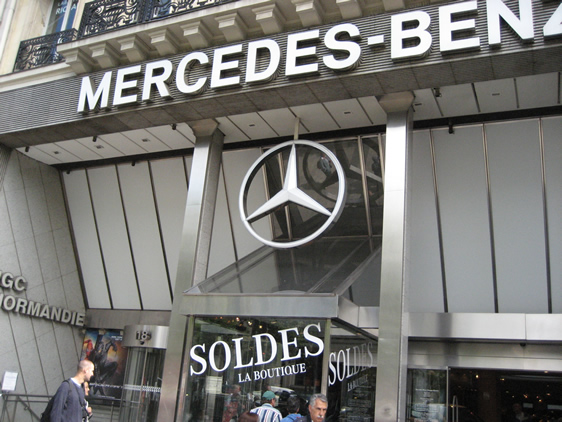
Above: That word SOLDES means "sale," and even though I figured we could get a deal if we used our negotiating skills, there were no takers.
As I was walking down the street, a little guy in a corduroy sport coat, walking in the opposite direction, made an odd gesture at me, taking his right fist and smacking his open left hand against it, like something Curly would do in the Three Stooges. Ken and Julie were walking alongside of me.
"What the hell was that?"
"I think he just put a curse on you."
"Why? I wasn't loud. I'm not dressed American (sane footwear, fanny pack). What did I do?"
"He was wearing one of those Palestinian checked things around his neck."
NOW I was mad. Julie said, "I could have said something nasty in French," and I was halfway thinking of asking her to go back. One, it's funny that this happened in Paris because that's where Nobel Peace Prize winner Yasser Arafat salted away most of the international aid given to his nation. Two, this brave foot soldier in the war against the infidel was doing his part by hanging out in the shopping district. Three, dude was as white as I was.
But I figured, I'm on vacation. If this is the worst thing that can happen, I'm fine.
They had started to put up the bleachers for Saturday's Bastille Day celebrations, which we would be attending. We passed the president's house, but Mr. Sarkozy was not in today. Judging from the grafitti and stickers that were put up, he's not a very nice guy who will send France alongside the United States straight down the path to hell. Generally this makes these sorts of people OK by me. I tend to go with who the graffiti is complaining about. Not that I'm not complaining about politicians myself; I just don't do it by ruining public spaces, and I don't like people who do.
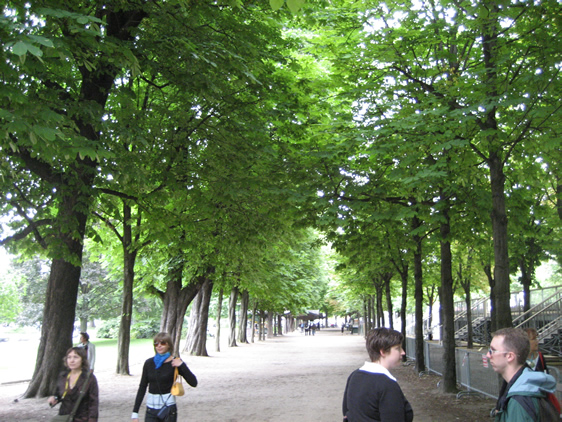
We were approaching Place de la Concorde, home of the Obelisk, where nearly 3,000 people were guillotined, and where now a giant reviewing stand was being constructed. Dark clouds were gathering overhead and I didn't have my umbrella. We were making our way to L'Orangerie, a small museum located in the Jardins des Tuileries.
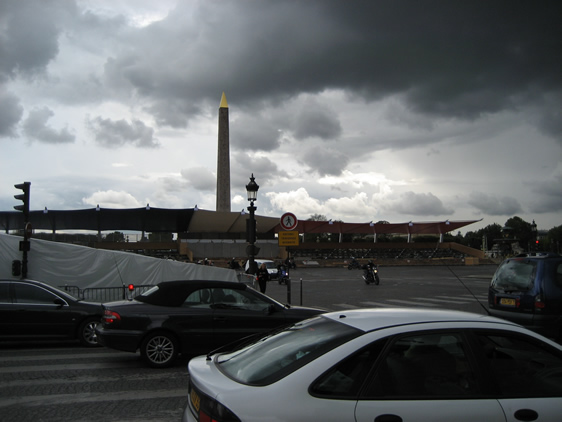
"The Monets are excellent, but the downstairs is only so-so," Julie said, "but since it's free with our card, we should go anyway."
She was right.
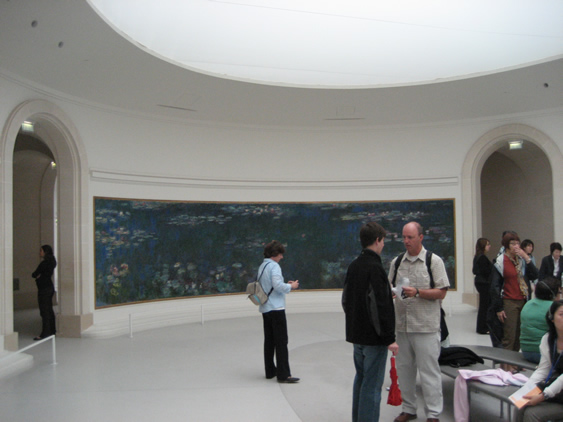
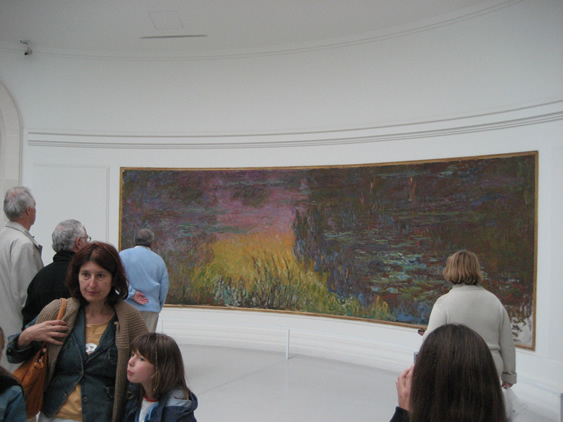
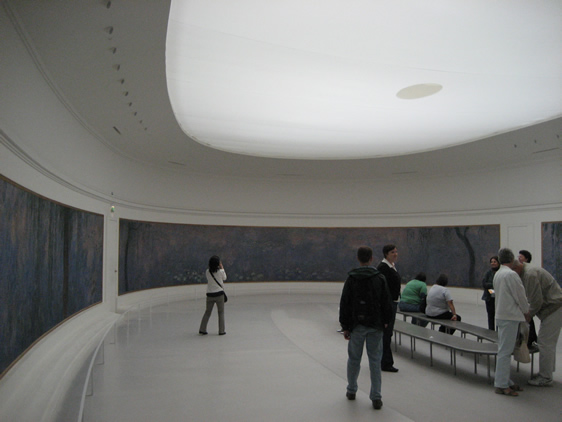
Claude Monet designed these paintings of water lilies specifically for this room. It had been closed for about six years and re-opened last year. These canvasses are about 35 feet long, and encircle the oval of the room, showing night, day, and all four seasons. It's another one of those things that are too big for me to describe correctly in a short amount of time and that you should probably see before you die.
These are the parts of Europe that you can't duplicate. Now if I show you a picture of a painting, you could see it, you would recognize it, and you may even be able to pick out some of the elements and brushstrokes. But I can't tell you or even show you what it feels like to be SURROUNDED by ten year's work, the same way I couldn't do it with Versailles or Sacre-Coeur. Pictures give you recognition. Immersion give you knowledge. (Which is why I hope you're forgiving me for these updates being so late; I've been focusing on the immersion part for most of the day.)
After L'Orangerie we came outside and the rain had stopped. We stopped and had lunch in the Jardins des Tuileries, then made our way up Boulevard Le Madeliene.
Champs Elysees is where everybody shops. Madeliene is the home of some of the world's most famous gourmet shops. I've been checking off food that I've been ruined for for the remainder of my life because I had a better version of it in Paris, and it includes:
-Croissants
-Roast chicken
-Strawberry jam
-Peaches
-Cherries
-Foie gras
And now, thanks to Julie, it includes mustard. We stopped in at Maille, a 260-year-old store which makes fresh gourmet dijon mustard with three different types of wine. They give it to you in ceramic containers to go, topped with a cork. Julie picked some up because she was out. In Oak Park. I tried some of the chardonnay and the champagne, and both of them were helping to melt the leftover crud in my sinuses from London. The woman helpfully pointed out that the containers were recyclable and she could bring it back and get a discount. I'm sure her next packing list is going to include it-crockery always goes well with intercontinental travel. It's probably better for her to keep it on her desk and tell her students it contains the souls and ashes of those who crossed her.
The next stop was Fauchon, which is undergoing a bit of work. They had the shop across the street being prepared for expansion. They carried every jam you could think of (except pomegranate, I checked) as well as every sort of cookie and sauce. They had a full patissserie with everything to go. They had a full wine cellar, and some of the wines were in a locked cooler and priced at 300 euro. Click through the website and you'll get what I'm takling about.
And right as we were crossing the square, the heavens opened. It was a thunderstorm/monsoon. We ran inside to Hediard, Fauchon's rival of about the last 117 years. (Actually, Hediard was open first, in 1854.) If forced to take refuge from a storm anywhere on earth, you would probably want to choose this place.
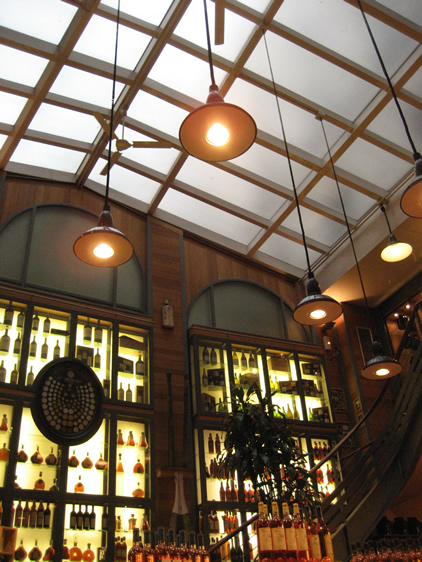
They had a full bar, a full wine cellar, forty different kinds of jam, as many mustards, and two shelves devoted to nothing but foie gras and truffles. If you were looking to cook a meal that could confidently be served in a four-star restaurant, you could start here and never cook the same thing for a month.
But you couldn't get meat or cheese. There were stores down the way for that. It would be fresher, cut to order, and wrapped immediately. And you would cook it immediately. Speed is key. Food that isn't meant to sit around when it doesn't have any preservatives in it. We found this out when the cherries that we'd purchased were through two days afterwards, even though we'd eaten the bulk of them as soon as we got them home.
The rain did not let up, and we had browsed Hediard to the point where if we purchased everything we wanted we would have needed a mortgage and a cargo container. But the rain was not letting up. I was forced to buy a gorgeous fully automatic Hediard umbrella for $30, and it served me well. And it better because I've seen more rain in Paris in the past week than I've seen in Vegas in over eight years, and I'll be home one of these days.
Our next stop was Le Maison des la Truffe, the House of Truffles, and this was a store that took things to a level beyond us mere mortals of gastronomy. Chicago aldermen may want to cover their eyes when looking this over. They had bags of truffles, cans of truffles, truffle oil in white or black, the whole shebang. And, in bags on a very high shelf, raw black trufles for 80 euro for five kilos. We were looking at buying some glaced pears as a gift-young pears that were dipped in an icing-like mixture. They also had some orange slices and cherries, which looked like so many candy marbles. We asked for some.
The gentleman in the butcher's outfit furtively looked around and started talking to Julie in high-speed French. Julie said thank you several times, as did we all, and we left.
"What was that about?" I asked. "Why didn't we get the pears?"
"He said that they were two days old and he wasn't sure they were still good. He said they would have better ones at Hediard next door. He said he was very sorry, but he didn't want to sell those to us."
And that sums up every single experience I've had in France. In America, I'm sure everybody was nice and polite at the grocery store during this, when a grocery store chain was caught rinsing its chicken in bleach so that they could sell it past the expiration date. But here, the gentleman said "I can't sell you that; it's no good." He then sent us to a competitor next door.
I'd never had glazed pears before. I probably would have thought they were terrific and ate about a thousand. But they weren't good enough for the guy who knew what he was doing, and he told us to skip it. It cost him a few euro but he did the right thing.
I've watched people barge into conversations between two people and immediately start asking questions in English, then act offended when the person didn't immediately respond the their question, like French was some sort of a Magic Decoder ring that they only switch into to keep things a secret. Here's a comparison: Picture you're walking on the Strip in Las Vegas. Some dude in a Chivas jersey interrupts your conversation and starts asking you questions in Spanish, not even giving you enough time to say you don't speak it. You're an American in America, you'd be a little upset, wouldn't you? Well your waiter's a Frenchman in France. It's not even a question of you cutting him some slack; it's vice versa. You're lucky he tries English at all.
I haven't run into a waiter here yet who's acted superior, and it's obvious after a few phrases that I don't speak the language. I'll understand a question and I'll answer in English. They don't mock my attempt, nor do they stop me when I'm still at it after they've answered my questions in English.
Did we get what we wanted? No. On the surface, is that rude? Maybe. Was it for the right reasons? I thought so. If he had to explain it in English, would it sound condescending? Maybe. But I'd rather than have that then be told "yes" six million times by a Japanese person who has no intention of giving you what you want.
Another important note that Julie told me when we got here: When a German kid says, "I don't speak English very well," he means "I haven't yet figured out the correct declensions for the accusative case." When a French kid says "I don't speak English very well," they mean it.
Following oru excursion through Madeleine Place, we were off to the Place Vendome. This is where the Ritz hotel is located, as well as the Asuterlitz column. After Napoleon beat Germany in the battle of Austerlitz, he captured their weapons, melted them down and built a giant column out of them, and put a statues of himself at the top. The whole statue is seen as a giant "fuck off" to Germany.
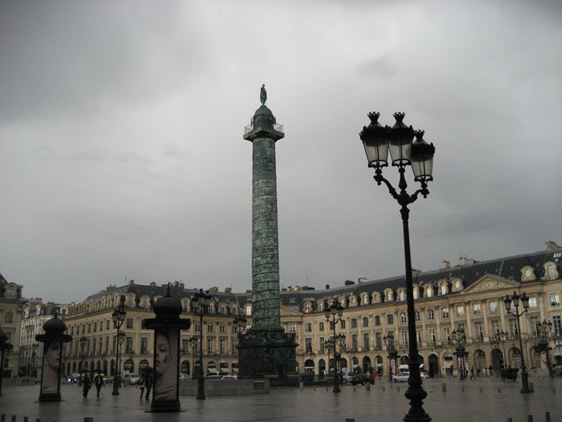
Or, as I started saying at the foot of it, "Ou'est l' HOMME? Ou'est l'HOMME?" (Who's the MAN? Who's the MAN? which should actually be "Qui est l'HOMME?") I stopped over at the Dunhill shop to see if they had any cigars in; they did not. I haven't seen one in a whille that did. The fine people at Dunhill sold me my first cigar.
In the three blocks that we walked to the Paris Opera House, there were four Cartier stores. We imagined a woman with more money than brains saying, "Oh yeah, the one in Place Vendome's a dive. A real shithole. I wouldn't go in there on a bet." There was also Charvet, the tailored shirt makers with their own chapter in Peter Mayle's "Acquired Tastes," a sort of paint-by-numbers guide to extravagant life. It's one of my favorite books. I was not going to go in and ask for, or even about, a shirt; in 1989 prices each shirt cost $350. I merely admired the institution from the street.
The Opera House didn't have much in the way of touring. We checked out the lobby, snapped a few photos, and headed back home.
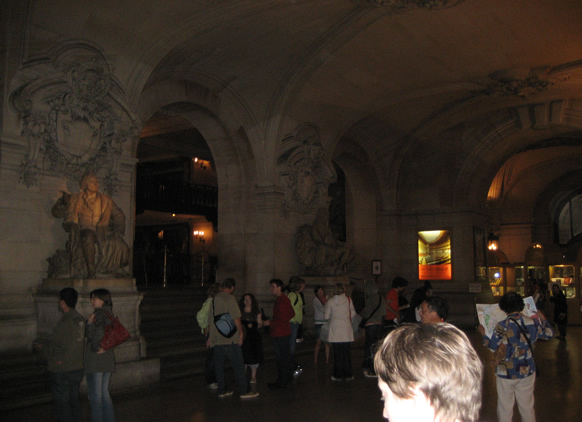
We stopped at the Cafe at the Grand Hotel, a gorgeous room with exceptional dessert, but by now you know Paris is full of those. We were seated next to a couple from Texas that was convinced that the substitute for French was louder English. They had been shopping and were showing off the day's purchases. The one woman with more makeup than jewelry and too much of both ordered, in succession, wine, wine, Jameson's on the rocks, and coffee. We couldn't have been there more than an hour.
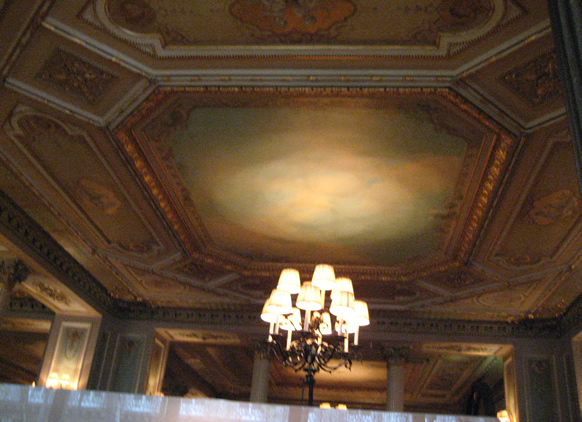
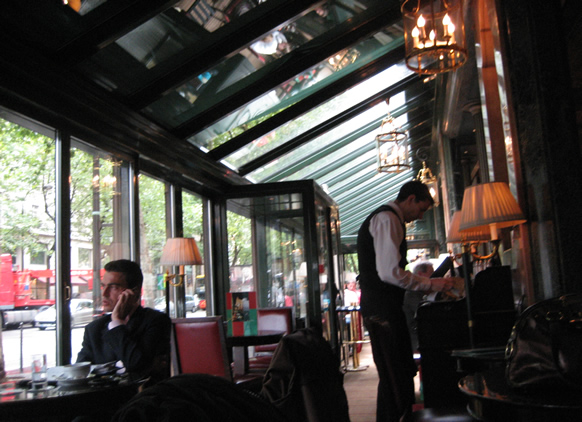
Julie grabbed groceries while Ken and I went to check out L'Invalides. Originally built as a rest home for veterans of Napoleon's wars, it's now an army museum and sill retains some functions as a hospital. It's also the location of Napoleon's tomb.
And while today was on the topic of cutting slack, I think we can put to rest the one about the French military avoiding conflict.
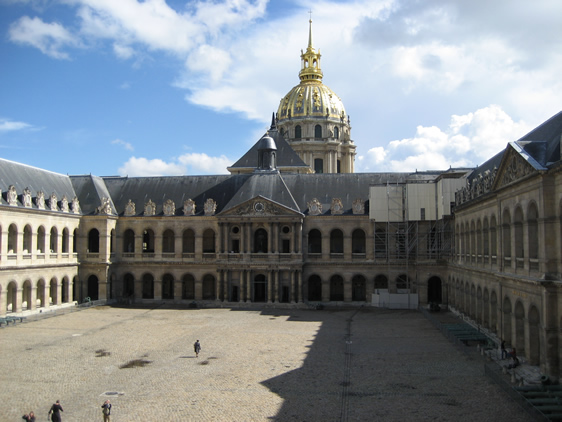
See that courtyard? All along the top level, under every one of those arches, is a plaque. It reads something like Mort pour la France, with a regiment or location listed, as well as a number of fatalities in that particular conflict.
In World War I, 1.4 million people were killed in France. This for a war that left the national borders of its principal combatants largely intact. Britain lost 1 million. and in every church, every museum, every public space, there's a listing for "Mort pour la France 1914-1918."
They only had a population of forty million people. Take a look at every pro sports team; one player dies and others are maimed. Take a look at your office. Take a look at your family. Count the minuses of young men that just disappeared, the inspiration behind the phrase "The Lost Generation."
The museum made it very clear that mutinies took place-soldiers refusing to run across the top of the trenches to be cut down by machine gun fire. They felt the commanders were incompetent, and kept them fighting for five years in a war that ultimately have no winner. (Even less so in 20 years.)
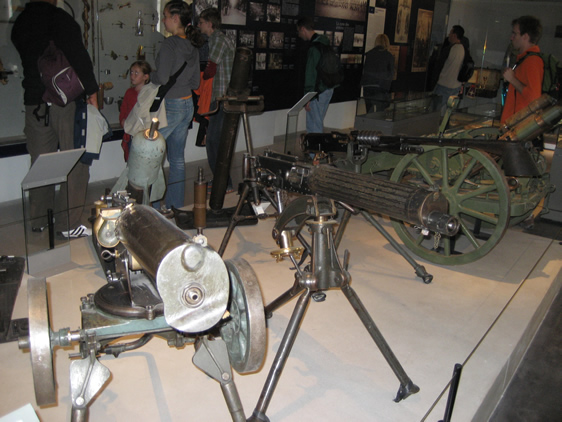
This wasn't fighting. This was barbarism. And the people of France were determined never to forget. And like I said, some of those plaques read Indochine, Coree, and Algeria.
Algeria's an interesting case. Read this and tell me that Iraq would sound like a good idea in the wake of it. We're a young nation, and while some wars have strained us politically, we've never fought another nation and suffered those sorts of population losses. I couldn't say I always would agree with it, but I thought I understood a little bit better what the stakes really were.
After that, we were hustled through the World War II museum, which is very interesting from the perspective of France. We saw Vichy propaganda, a small room off to the side devoted to the Resistance, and several examples of uniforms-all at high speed, because the museum was closing.
We stopped at Napoleon's tomb, which had the typical subtlety associated with the man all over Paris.
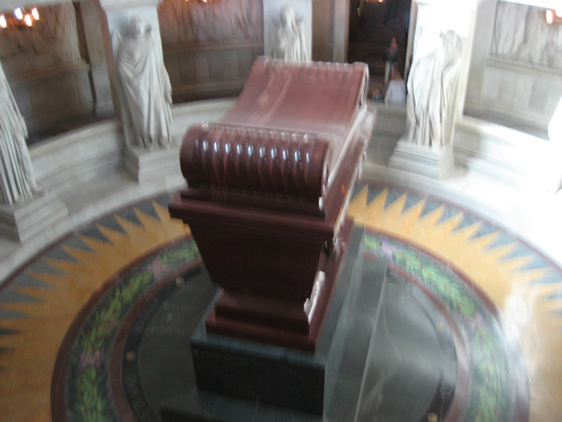
The monument's about twelve feet tall and located below the rotunda. It was explained that "even in death, people have to bow to him." It's surrounded by statuary denoting military victories.
Outside they were preparing for a reception. Military leaders in all manner of uniform colors were walking outside, taking each other's pictures, and enjoying themselves.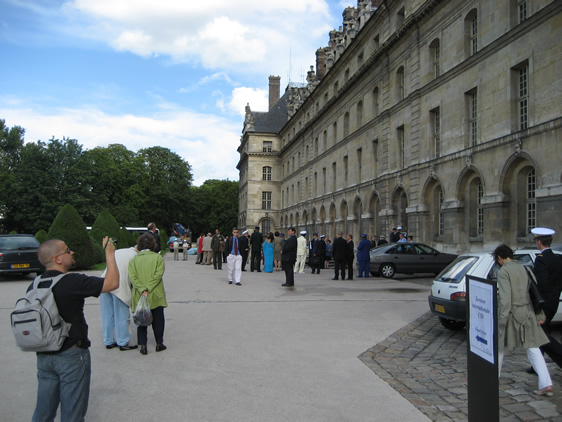
Soon Ken and I were off to do the same. We were meeting up with the Orsonis, Julie's host family from one of her earlier stays in Paris. We went to Pinxo, (pronounced PINCH-oh) a Basque restaurant near the Vendome area that we'd visited earlier. Francois knew about it because a friend of his had sold the place some Chilean wine, which would ordinarily cause shrugs of disdain in this country. They're as patriotic as we are. Mme. Orsoni, whose name escapes me even though Julie told me four times, explained to Julie in French that we would be eating Basque food this evening. "Oh," I said to Julie, "Spain!" They book shook their heads gravely. Spiritually the Basque region is considered part of France, and near Aquitaine is considerd French Basque country. The ETA certainly thinks they're not a part of Spain.
We were served an appetizer of radish sprouts with three choices of powdered dips: salt, pepper, and cayenne pepper. Radish sprouts are not very big. It was like picking wheatgrass. Four cities' worth of people recognized the absurdity of dipping something the size of a Q-Tip, only more delicate, into spices. Even if you ate three or four of these at once it wouldn't have filled up your mouth as much as one Cheeto.
I ordered entirely in French. "Tres bien!" Francois said, smiling. Later in the meal, after we'd tried the white and red wines and I'd successfully ordered dessert, I explained, "Je comprende cuisine; je ne comprende Francais." (I understand food; I don't understand French.) Three of us got an entree of steamed vegetables and they showed up in three bowls, as did the starters for everyone else. My entree showed up in three sections. So did everyone else's. When the desserts did this, I pointed at the plates and exclaimed, "Trois!" and pointed at everyone's plates and shrugged. Francois asked the staff what's up; they said this was done to encourage sharing. Francois and Julie, who'd ordered the same dessert, grandly swapped one-third of their desserts for the others, though they'd ordered the same thing.
Julie pointed out to Francois that Paris had declared today National Tourist Day. He responded by miming training a duck gun on the opposite table; he was jokingly ready to shoot some. The conversation turned to work, and I handed over a couple of my work cards, figuring that explained things a little better than what I could explain verbally. They gleefully mentioned using them to get through customs quicker. I explained carefully they would not help.
After a terrific ride where Ken had to attempt to explain in French what a tilt-o-whirl was as we passed a carnival, we were soon home and asleep after a very long day. Tomorrow, though, would be some serious fun.
